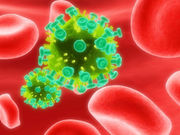Research supports need for regimens that protect against several targets
THURSDAY, Sept. 21, 2017 (HealthDay News) — A combination antibody strategy could be the key to halting the spread of HIV, according to results from two experimental studies. The research was published Sept. 20 in Science and Science Translational Medicine.
One research team led by Dan Barouch, M.D., Ph.D., director of the Center for Virology and Vaccine Research at Beth Israel Deaconess Medical Center in Boston, injected lab monkeys with two antibodies that block HIV by attaching to different targets located on the virus. The researchers then tested the cocktail’s effectiveness by exposing the monkeys to two strains of HIV. Each was vulnerable to one of the antibodies, but not the other.
Monkeys that received either of the antibodies individually became infected when exposed to both strains of HIV, the researchers reported. However, when they received the two-antibody cocktail, they were protected against both HIV strains.
Researchers from the other team, led by Gary Nabel, M.D., Ph.D., chief scientific officer and senior vice president of Sanofi in Cambridge, Mass., took things a step further: They genetically designed a single antibody that acts as three antibodies, attacking three separate targets on HIV. All monkeys given the triple combination from the single antibody were fully protected from the virus, the researchers reported.
The second study was supported by Sanofi. Several authors from both studies are named on patents associated with the research.
Abstract/Full Text 1 (subscription or payment may be required)
Abstract/Full Text 2 (subscription or payment may be required)
Copyright © 2017 HealthDay. All rights reserved.








